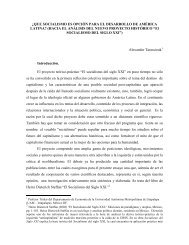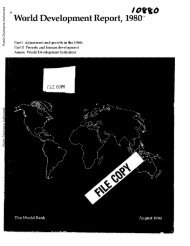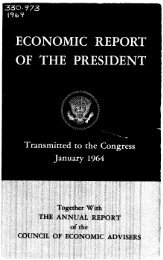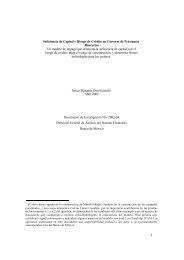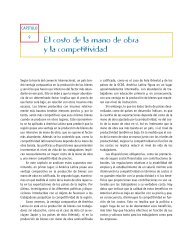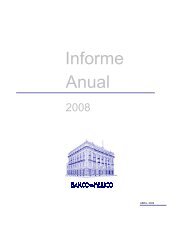World Bank Document
World Bank Document
World Bank Document
You also want an ePaper? Increase the reach of your titles
YUMPU automatically turns print PDFs into web optimized ePapers that Google loves.
and tighter fiscal and monetary policy. In terms of<br />
stabilization, the results have been good; the budget<br />
and current account deficits have been reduced<br />
payments position transformed from a deficit of $3.2 bil- substantially. But progress toward longer-term<br />
lion to a surplus of $2 billion. Indonesia's government efficiency has been slow. In particular, the governfollowed<br />
this improvement by liberalizing interest rates ment has failed to carry through most of its trade<br />
and abolishing credit ceilings. In 1983-84, the economy reforms, postponing the vitally needed expansion<br />
recovered, growing by about 5 percent yearly.<br />
eforts.<br />
In the late 1970s, Hungary resumed implementation of of exports.<br />
a program of economic liberalization initiated a decade Turkey, too, avoided adjustment in the 1970s. It<br />
earlier, Market-based production incentives were financed its current account deficits by borrowing<br />
enhanced, subsidies reduced, and the autonomy of heavily and continued to protect domestic indusenterprises<br />
expanded. When the international economic try behind high import barriers. This promoted a<br />
environment deteriorated in 1979-82, Hungary did not high-cost, inefficient industrial structure; the increhalt<br />
liberalization, but did reverse the deterioration in mental capital output ratio for manufacturing had<br />
the balance of payments through stabilization measures . i<br />
such as devaluations, reductions in investment, and tripled n a decade. In an effort to maintain<br />
sharp increases in domestic energy prices. The stabiliza- growth, the government pursued expansionary<br />
tion program led to a temporary slowing of economic monetary and fiscal policies. Nevertheless, GNP<br />
growth from 5 percent in the 1970s to 2 percent in 1980- growth fell from about 6 percent a year in 1967-72<br />
83, but prospects for restoring moderate, sustainable and 1973-76 to 2 percent a year in 1976-80. By the<br />
growth are now good. Meanwhile, Hungary has contin- late 1970s, annual inflation had risen to 100 percent<br />
ued to extend the reach of its market-based, outward- and debt service obligations (including short-term<br />
oriented development strategy, which played a key role<br />
in steering the country clear of debt rescheduling difficulties<br />
in recent years.<br />
debt) were three times the value of exports.<br />
Between 1978 and 1980, Turkey rescheduled over<br />
$9 billion, or nearly 80 percent, of its external<br />
debts.<br />
In January 1980 the government announced a<br />
shift toward an outward-oriented development<br />
strategy, with greater reliance on market forces.<br />
The early stages of the program involved a large<br />
devaluation of the exchange rate and the adoption<br />
of a crawling peg; tight monetary restraint; deregulation<br />
of interest rates; a phased reduction in con-<br />
sumption subsidies; rationalization of the public<br />
years, particularly in the form of sector adjustment<br />
loans.<br />
The Special Action Program comprises financial measures<br />
and policy advice to help countries implement<br />
adjustment measures needed to restore growth and creditworthiness.<br />
The principal elements of the program investment program; and higher prices for state<br />
are (a) expanded lending for high-priority operations in enterprises. Within two years, the benefits were<br />
support of policy changes, (b) measures to accelerate dis- quite apparent. GNP grew by roughly 4 percent a<br />
bursements under existing and new high-priority year in 1980-83; inflation was cut by two-thirds;<br />
projects, and (c) advice to governments on reordering merchandise exports doubled despite a world<br />
investment priorities and improving external debt man- recession; the current account deficit declined from<br />
agement.<br />
Through December 1984, forty-four countries bene- over 5 percent of GDP to 3 percent; and the counfited<br />
from the program. Fourteen new loans were made try's creditworthiness was restored.<br />
under this program, including two SALs and twelve sec- With the easing of the immediate crisis, the Turktor<br />
adjustment loans. Ongoing projects were modified to ish government has been able to develop its<br />
increase cost sharing, establish revolving funds, restruc- reforms. It is gradually decreasing import quotas<br />
ture design and implementation, add financing for work- and reducing tariffs, reforming the management<br />
ing capital and recurrent costs, and make use of supple- and financing of state enterprises, tightening its<br />
mentary loans. By releasing the immediate financial m<br />
constraint, these operations have permitted the contin- management of external debt and domestic bankued<br />
implementation of 267 projects, representing an ing, strengthening the tax system, and raising<br />
approximate value of about $13 billion. Overall, the energy and agricultural prices closer to interna-<br />
Special Action Program will raise <strong>World</strong> <strong>Bank</strong> disburse- tional levels. Although much has been achieved,<br />
ments in fiscal 1984-86 by about $4.4 billion over what more recently the adjustment process has weakthey<br />
would otherwise have been. The program has now ened, as evidenced by the way that inflation and<br />
been formally terminated, but the instruments intro- the budget deficit started to rise again during 1983-<br />
duced during its implementation will continue to be 84. However, Turkey's overall performance since<br />
used, as needed, as part of the <strong>Bank</strong>'s overall operations. 80h been one of ermos pessive tun-<br />
= 1980 has been one of the most impressive turn-<br />
67




